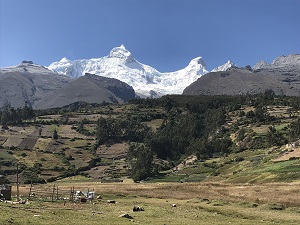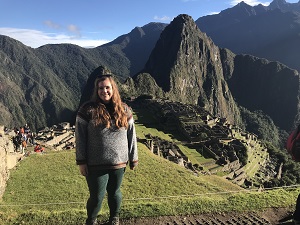 Josie Handley is a current PhD student in the Department, researching the resilience of agricultural systems to human activities and climate change in the Peruvian Andes. Over the summer, she conducted fieldwork in Peru – read on to learn about her experiences…
Josie Handley is a current PhD student in the Department, researching the resilience of agricultural systems to human activities and climate change in the Peruvian Andes. Over the summer, she conducted fieldwork in Peru – read on to learn about her experiences…
“During July, I was lucky enough to visit Peru and carryout fieldwork related to my PhD. The two-week trip involved visiting two of my study areas, the Ancash District and the Chillón Valley. Whilst in these regions I took sediment core samples from six sites, including lakes and peat bogs, which provided me with the majority of my samples for my PhD. In the field, we also interviewed local farmers and held community workshops to discuss the present day issues affecting agriculture productivity and sustainability within the study areas. This was also an excellent opportunity to record local oral histories about changes in farming practices within living memory, to go alongside the deeper history perspective the collected core records will hopefully provide.
Being out in Peru conducting fieldwork was not only useful in terms of sample collection and conducting the interviews, but it also provided the opportunity to see how the agricultural land was being cultivated and worked in the present day. This can provide a modern analogue for the agricultural activity signals we may pick up through analysis of the core sequences.
I also got the opportunity to attend two workshops, one at Universidad National Santiago Antunez de Mayolo, Huaraz entitled ‘Living with Climate Change’ and the second at Universidad Nacional Mayor de San Marcos, Lima. These workshops were a great opportunity to network with Peruvian colleagues from archaeology as well as local NGOs and governmental organisations such as the Mountain Institute and the National Institute of Investigation on Glaciers and Mountain Ecosystems.
My experience of fieldwork ran relatively smoothly; this was largely due to having native speakers of both Spanish and Quechua with me for the majority of the trip. This particularly helped when conducting interviews and structured discussion sessions. It was also useful having people that knew the areas well, especially when it came to site selection, as two of the sites were not in the original itinerary but turned out to be great coring locations, thanks to the local knowledge of the area. Whilst I was in Peru, I was also able to make the most of my trip and took the opportunity to do some travelling and spent two weeks after my fieldwork on the tourist trail of the south visiting Cusco, Machu Picchu, Nazca, and Huacachina, an oasis in the desert.”


